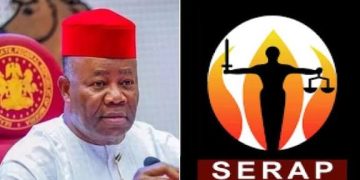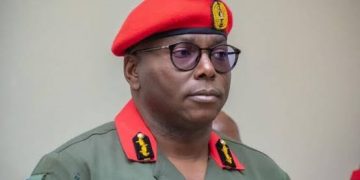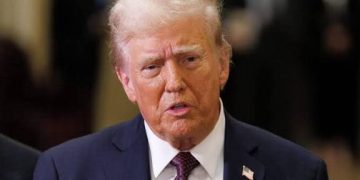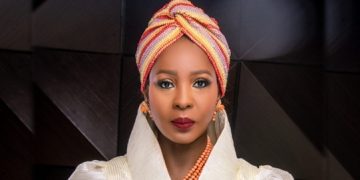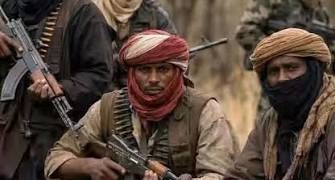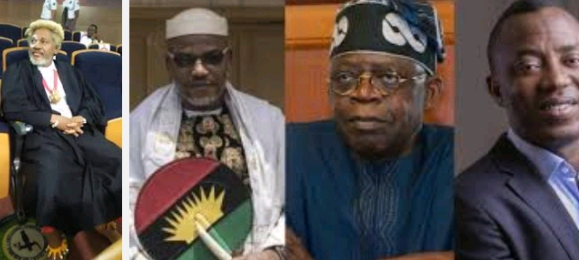In Nigeria’s constitutional framework, the right to peaceful protest is enshrined as a cornerstone of democracy yet, in practice, it remains one of the most frequently challenged civil liberties. Section 40 of the 1999 Constitution guarantees every Nigerian the right to peaceful assembly and association, while the Public Order Act empowers governors to regulate the time, place, and manner of such gatherings. However, the persistent use of force by state actors against peaceful demonstrators continues to raise serious constitutional and human rights concerns.
This tension between law and enforcement once again came into focus following the recent arrest and remand of Aloy Ejimakor, lead counsel to detained IPOB leader Nnamdi Kanu, and Kanu’s younger brother, Prince Emmanuel Kanu. The two were reportedly arrested during a peaceful protest demanding Nnamdi Kanu’s release and have since been remanded at the Kuje Magistrate Court in Abuja.
The development drew immediate condemnation from civil rights advocates and political figures, including human rights lawyer Malcolm Omirhobo, who described the arrests as unconstitutional and an affront to Nigeria’s democratic principles.
In an exclusive interview, Omirhobo, a prominent human rights lawyer who gained public attention for appearing in court dressed as a traditional priest in protest of religious hypocrisy, spoke unequivocally in defense of the protesters.
“It is their constitutional right to protest,” he said. “The likes of Bola Tinubu, Wole Soyinka, and Femi Falana protested in the past, and no one arrested them. As long as the protesters were not violent, the police had no legal justification to detain them.”
Omirhobo further emphasized that peaceful protest is vital to democratic governance, describing it as a means of civic accountability rather than rebellion.
“Protests are good for democracy,” he added. “If the protesters were peaceful, their arrest would be a violation of their rights. The government should instead listen to their grievances.”
When asked about the implications of Ejimakor and Emmanuel Kanu’s detention on Nnamdi Kanu’s ongoing trial, Omirhobo expressed concern that it could stall the judicial process.
“Their detention could delay the trial because the lead counsel and a key witness are both in custody,” he explained. “However, being arrested during a protest is a bailable offense. If the bail application is properly made, they should be released immediately to continue with the case.”
Omirhobo, who has long been vocal against bad governance and the abuse of state power, said he was “110 percent in support of the protest,” lamenting only that he was unable to attend personally.
He also urged the protesters to remain steadfast in their cause, advising them not to “remove their foot from the gas” until meaningful change is achieved.
Turning to the broader issue of Nnamdi Kanu’s prolonged detention, Omirhobo criticized the government for what he described as a waste of public resources.
“Nnamdi Kanu has suffered enough,” he stated. “The government is wasting taxpayers’ money chasing shadows. Even previous administrations made similar mistakes. The best thing this government should do is release him and move on.”
On the contentious question of Igbo marginalization, Omirhobo offered a nuanced perspective. He argued that while Igbos may face political exclusion in federal appointments, they are not discriminated against in private or social life.
“Before the civil war, the Igbos held top positions in government based on merit,” he noted. “Leadership should not be about ethnicity but about capacity and competence. Some Igbo governors are not liked by their own people so it’s not always about tribe.”
He cautioned against the idea of a “puppet” Igbo presidency installed merely to pacify ethnic sentiments, saying true leadership should be rooted in fairness, merit, and performance.
Omirhobo also commended the entrepreneurial spirit of the Igbo people, referencing examples such as Victory Estate in Lagos, which he described as a symbol of the “Igbo Midas touch” an illustration of their ability to transform communities through innovation and enterprise.
“The most important thing,” he said, “is who can deliver, regardless of tribe. Predictability and fairness should guide our national system.”
Meanwhile, human rights activist and African Action Congress (AAC) presidential candidate Omoyele Sowore took to Facebook to decry the arrests, alleging political motivation behind the move.
“I just learned that illegal IGP Kayode Egbetokun has sent Nnamdi Kanu’s brother and lawyer, Aloy Ejimakor, and 11 others all the way to Kuje Magistrate Court to get them remanded in prison at all costs,” Sowore wrote, tagging his post with the hashtag #FreeNnamdiKanuNow.
Sowore further questioned how Nnamdi Kanu could “open his defense” while his lead attorney and a key witness remain in detention, calling the arrests “an orchestrated scheme.”
As the debate intensifies, legal analysts and rights advocates insist that the core issue remains the protection of constitutional freedoms. The right to protest peacefully and without intimidation is not merely a privilege granted by the state but a fundamental right that defines Nigeria’s democracy.
In the end, the fate of Nnamdi Kanu’s case and the integrity of Nigeria’s democratic institutions may well depend on how faithfully the government upholds this principle.
Daniel Okonkwo is a seasoned writer, human rights advocate, and public affairs analyst, renowned for his thought-provoking articles on governance, justice, and social equity. Through his platform, Profiles International Human Rights Advocate, he consistently sheds light on pressing issues affecting Nigeria and beyond, amplifying voices that call for accountability and reform. He is also a professional transcriptionist and experienced petition writer, with over 1,000 published articles to his credit on Google. Many of his works have been featured in Sahara Reporters and other major news outlets. In addition, he works as a ghostwriter, freelancer, and journalist.


